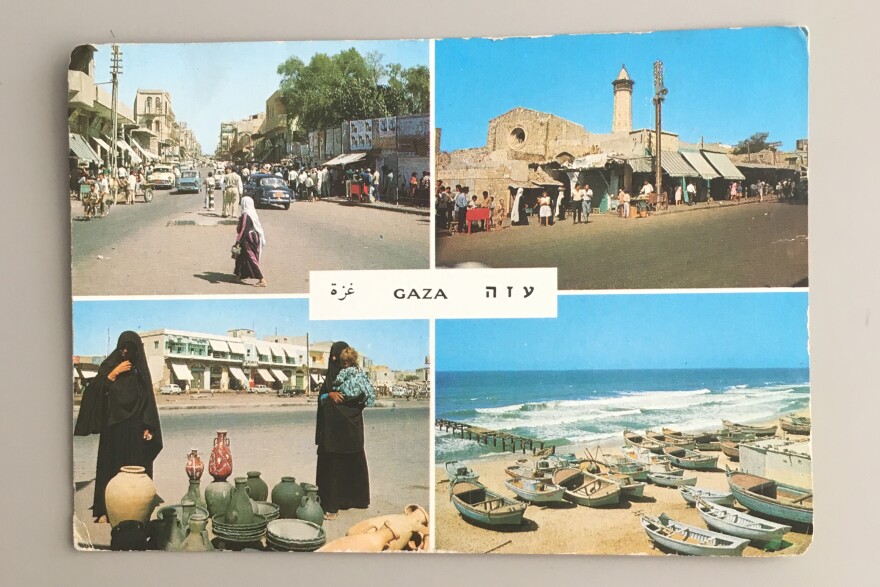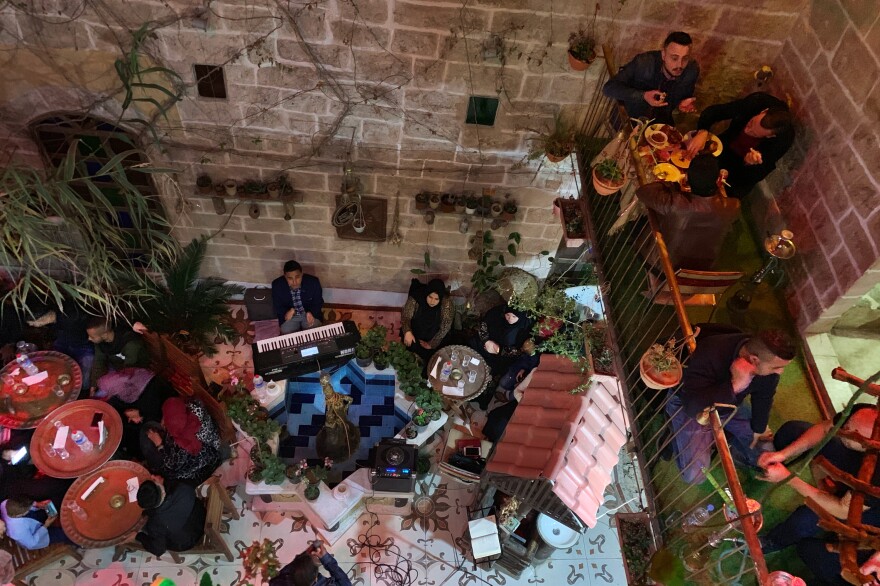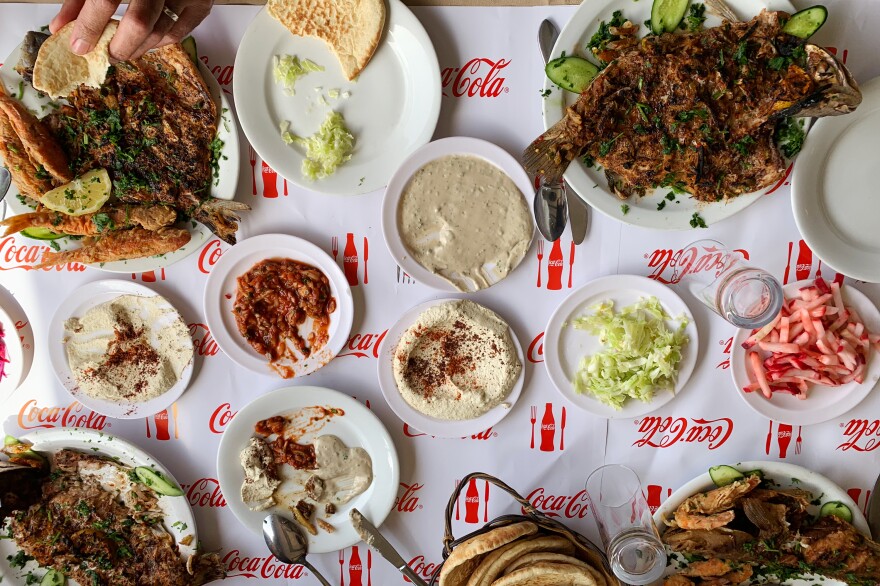It's not easy to find a tour guide in Gaza. Even clerks at the local Tourism Ministry, a vestige of the 1990s that remarkably still exists, struggle to recommend professional guides, before suggesting a man who hasn't led tourists around for 20 years.
Ayman Hassouna seems delighted to spend a sweltering day in a suit jacket, showing off the historical sites, colorful markets and delicious grilled fish of his native Gaza — among other unexpected gems made even more precious by the reality that most people in the world are unable to experience them.
Gaza used to be an ancient crossroads connecting Arabia to Europe and, in more recent years, a magnet for international visitors exploring the Holy Land. Today this narrow strip on the Mediterranean Sea is one of the most isolated spots on Earth.

Ever since the Islamist militant group Hamas took control in 2007, Hamas and Israel have fought three wars, and neighboring Egypt and Israel have imposed a blockade, restricting goods, trade and travelers. Israel allows in international aid workers, journalists and diplomats, but tourists are prohibited.
Israeli officials say the blockade is necessary to shield against Hamas. Palestinians call it collective punishment for the enclave's 2 million residents, who suffer daily electricity cuts, bad drinking water and a collapsed economy.
"Even if it were possible for tourists to enter Gaza, it would not be advisable," the Lonely Planet travel guide company's website says. White House adviser Jared Kushner has a proposal to revitalize Gaza's tourism industry, but for now it is but a dream, only to be implemented if an elusive Israeli-Palestinian peace deal is ever reached.

This NPR team, an American journalist and a Gaza-based Palestinian journalist, are in search of a different Gaza from the enclave of violence and misery that we regularly document. Together with Hassouna, we retrace the route he used to take tourists on, before Gaza became sealed off to them.
As we drive past the sites, our eyes are drawn to Hamas militant training bases, the rubble from a recent Israeli airstrike, U.N. warehouses storing food for the poor and young men sitting on curbs, trapped in a place with few jobs and a bleak future. Hassouna, who teaches archaeology at Gaza's Islamic University, seems not to notice. He is fixated on what you cannot see: the ruins of Gaza's ancient port city that lie beneath the sands.
Gaza has a "second face: the face of culture, the face of tourism," says Hassouna. "We want to be Gaza open, for the people, for the world. Only that."
There is much to see in Gaza. Here's what Hassouna points out in one day.
Pasha's Palace

Relics of Gaza's ancient past — and reminders of its former glory — are on display in a small exhibit at the stately Pasha's Palace, built by a Mamluk sultan in the 13th century and completed during the Ottoman era. Napoleon is said to have spent a few nights here.
Among the antiquities on display are two long ceramic jars, dating to the third to seventh centuries, that traveled on ships from Gaza across the Mediterranean, carrying olive oil and wine.
"When I see these jars, I live before 1,000 years," says Hassouna. "Gaza had peace in that period and have a good economic [status] in this period."

Old Town Antique Store
In between caged rabbits and heaps of vegetables in Gaza City's Zawiyeh market is a kind of shrine to the days when Gaza was open to the world.
Saleem Elrayes has run the Old Town Antique Store for more than 30 years. The small shop brims with dusty treasures, from English books and old maps of Palestine to ancient coins and small brass hamsa pendants that are shaped like hands and ward off the evil eye.



Inside, Elrayes sells us what he calls "the last postcard in Gaza." The vintage print is a relic from a different time, with a photo collage of fishing boats and veiled women selling pottery. It was printed by the Israeli postcard company Palphot in 1967, the same year that Israel captured Gaza from Egypt in the Six-Day War and Israelis and international travelers began visiting for shopping sprees and excursions.
"Many tourists used to come here from the street," Elrayes says about his antique shop. "French, Italian, British, American."
By the 1990s, the Palestinian Authority government was formed, an airport was built in Gaza and there were hopes for peace. Then came deadly violence in the 2000s, with the Palestinian uprising and Israeli reprisals. Israel bombed Gaza's newly built airport runway after a deadly Palestinian attack, and in 2005, Israel pulled out of Gaza. In 2006, Hamas won Palestinian parliamentary elections and a year later expelled its Fatah rivals from Gaza and took control.
Today, Elrayes buys his merchandise from Palestinians selling their household goods before they emigrate to escape Gaza's current miseries.
Tombs, mosques and churches
A short walk through Gaza City's Old City reveals Gaza's rich religious history. There's a small building said to be the tomb of Samson from the Bible and a domed tomb said to be the resting place of the Prophet Muhammad's great-grandfather, Hashim ibn Abd Manaf.
Nearby is the blue-carpeted Omari Mosque, Gaza's oldest Muslim house of worship still in use. Its architectural elements reveal that the mosque was previously a Crusader church.

Today, there are other churches serving Gaza's small Christian community in the neighborhood — the same neighborhood that hosted an ancient Jewish community that existed until 1929, when the community fled amid violence.

Samaritan bathhouse
Across the street from the Omari Mosque is the Samaritan Hammam, the only active Turkish bath in Gaza. It was originally run by members of the ancient Samaritan religion, and Gaza's Mamluk governor restored it in 1320.
Today, there are separate hours for men and women, who douse themselves with buckets of hot and cold water, relax on a hot marble slab in the bathhouse's steamy central room and enjoy a vigorous olive oil scrub from a bathhouse attendant.
Beit Sitti cafe
Veteran Gaza playwright and caricaturist Atef Salama converted an old mansion into a cafe-restaurant called Beit Sitti, Arabic for "my grandmother's house." Opened in 2017, the three-floor cafe in a narrow alleyway of Gaza's Old City is an ode to Palestinian cultural heritage.

Set around an airy courtyard with caged birds and plants climbing the walls, the cafe serves a traditional Palestinian breakfast spread of jams and mini flatbreads topped with cheese and za'atar spices. On Thursday evenings, it hosts a young clientele for dinner, water pipes and live Arabic music.
Salama, the owner, wears a white suit he bought in St. Petersburg, Russia, where he studied. He has seen the world, and many of his friends have emigrated, but he insisted on staying and opening the cafe. "Why not invest in Gaza? Gaza's my homeland. I love Gaza. I will not leave Gaza," he says.
Al-Mathaf Hotel

This 34-room boutique hotel with sea views is named after the Arabic word for "museum" — its owner's private collection of Gazan antiquities is displayed in the foyer.
Al-Mathaf Hotel itself is a museum, with its resplendent reception area and ground floor a patchwork of Gazan architectural designs, built from colored tiles and beige stones collected from old Gazan homes. Rooms, from $100 per night, feature a mix of modern Arabic designs and traditional furniture.
Al Salam Abu Haseira fish restaurant


At the beachside Al Salam Abu Haseira fish restaurant, with wide windows facing the Mediterranean, locals dine on grilled fish — seasoned with hot pepper, parsley, onions, lemon and tomato — or shrimp zibdiyeh, a spicy tomato stew served in Gaza's traditional clay zibdiyeh cooking pot. The pots are made from clay at a cavernous factory in Gaza City.
The restaurant's specialties are its sides. Dagga Ghazawiyeh, or Gaza salad, is a fiery-hot mash of tomatoes, cucumbers, dill and hot pepper pulverized with a mortar and pestle and bathed in olive oil. Qedra is spiced rice and meat cooked for hours in a zibdiyeh pot.
Hassouna used to bring his tour groups here at the end of their excursion, before Gaza's years of upheaval since 2000.
At the long dining table facing the sea, the tour guide ends the day dwelling on a tragedy of his homeland. Even if the territory were open to tourists today, he says, he would not be able to guarantee their safety to show them the riches that are Gaza's heritage.
Copyright 2023 NPR. To see more, visit https://www.npr.org.




